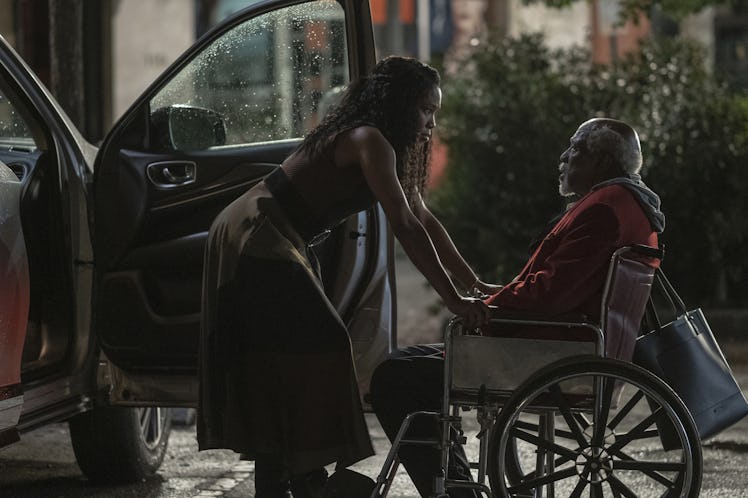
Let's Talk About That Final Chief Crawford Scene On 'Watchmen'
HBO's Watchmen has a lot of different themes and highfalutin concepts embedded within the six episodes that have aired so far. But holding the story together is an old fashioned whodunit mystery. Someone hung Chief Judd Crawford from a tree until he was dead. The question is who, and why? There's only ever been one suspect, but as Detective Angela Abar insists, it's an answer that doesn't make any sense. But is she wrong? Is it possible William Reeves killed Chief Crawford on Watchmen? Warning: Spoilers for Watchmen follow.
When Angela drove up that night after receiving a phone call to come to "the oak tree out on Rolling Hill," she found two people. One was her friend, the Chief of Police in Tulsa, Judd Crawford, dead. The other was a wizened old man in a wheelchair who would only say he did it. Angela thought he was nuts. How could a 105-year-old man, who couldn't even walk, hang a man like Crawford, still in his prime (and coked up to his eyeballs)?
Angela determined the man in question was her grandfather William Reeves, but she still couldn't believe the story. But fans have been getting the sense there's way more to Reeves. Those suspicions only grew once it was revealed the chair was all a ruse, and Reeves was perfectly ambulatory.
But Reeves' secret goes far deeper than a murder mystery. In Episode 6, "This Extraordinary Being," Angela discovers her grandfather was Hooded Justice, the first masked vigilante. He was part of The Minutemen, a Justice League-type group of superheroes. No one ever saw his face, not even Laurie Blake's mother, Sally Jupiter, despite Laurie believing for years Hooded Justice was her birth father.
But one day, he walked away from all of it and disappeared. No one ever knew why.
Reeves quit after he uncovered a real-life comic-book-style evil plot. A white supremacist group called Cyclops were using science-fiction style technology to brainwash African Americans into violent behavior, in hopes of starting a race war. The technology was a flashing light embedded into a movie projector at a "Blacks Only" theater.
But when Reeves called his fellow superheroes for backup, they refused to help him. He went it alone, defeated the bad guys single-handedly, and took home the projector and the technology. But his years of vigilantism had taken a toll on his family. His wife, June, left him and took their son, Marcus.
Reeves lost his family, but he kept the technology. When Angela relives Reeves' memories of the night Crawford died, she sees he shone a flashlight in the Chief's face. That flashlight began to blink, the same way the projector did in the theater.
"You can hang yourself now," Reeves commands Crawford. When Angela watches herself pull up later than night, Crawford is dead.
Reeves declares himself Justice when Crawford first meets him, and he claims he is setting wrongs right. But did he? And if so, what gives Reeves the right to be judge, jury, and executioner? That's always been the trouble with vigilantes. Pop culture holds characters like Iron Man and Captain America up as heroes, from a certain point of view. But from a different angle, their actions are no more clear cut than Reeves'.
Angela now has to decide. Is Reeves guilty? What is justice? And how will Laurie Blake react if (and when) she learns any of this?